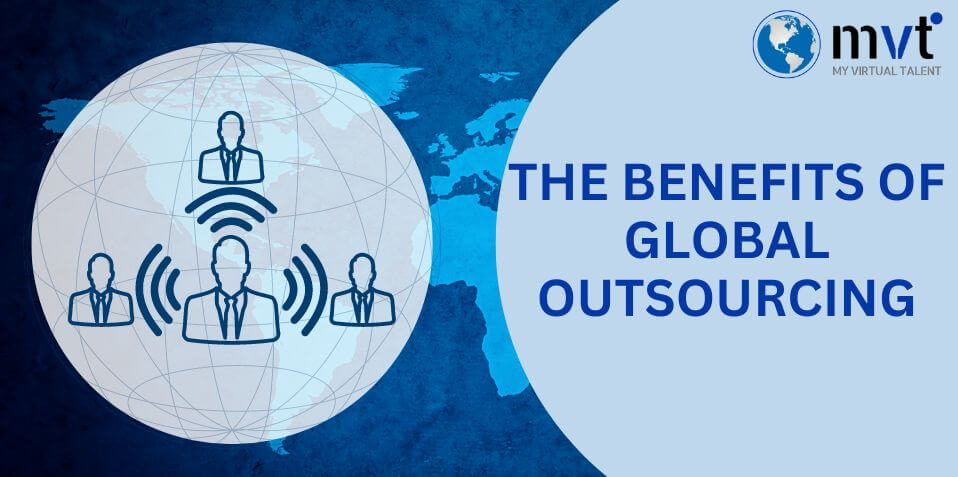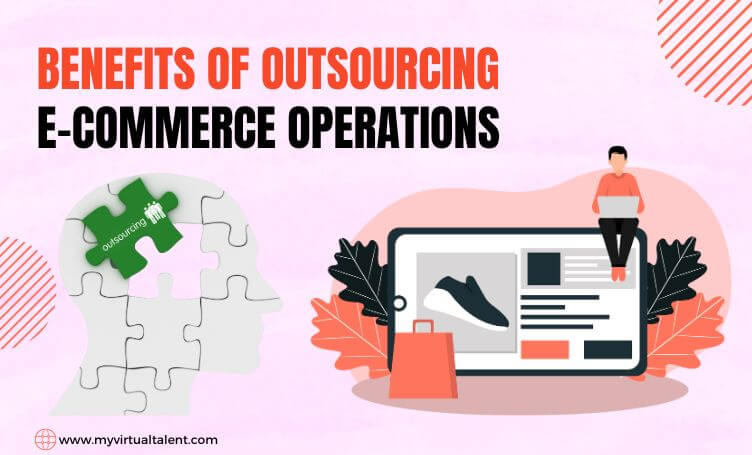
Global outsourcing is a key strategy for modern businesses that want to succeed in today’s tough market. It involves using the skills and lowering the costs of workers from other countries. This approach can lead to many advantages. For one, it can significantly cut down operational costs because wages in different countries may be lower, and it can reduce the need for office space. Additionally, outsourcing allows businesses to tap into a wide range of talents and innovations that are not always available locally. This can boost productivity and bring fresh ideas into the industry. Companies outsourcing globally can work more efficiently and creatively, helping them stay ahead in a competitive business world.
What is global outsourcing?
Global outsourcing is when a company hires other companies or individuals from different countries to do certain jobs. This approach is often used to cut costs, gain access to special skills or advanced technology, and boost efficiency.
For example, a company might use global outsourcing to handle their customer service by a team in another country where the labor cost is lower. Or, they might hire software developers from another country with specific expertise that isn’t readily available at home.
Work commonly outsourced globally includes manufacturing, software development, customer support, and various administrative duties. This trend has grown popular recently because modern technology makes it much easier to communicate and work with people worldwide. With tools like video calls, cloud computing, and real-time collaboration platforms, companies can manage their outsourced teams effectively despite the geographical distance. This makes global outsourcing a practical choice for many businesses looking to improve their operations and cut costs.
Why do businesses turn to global outsourcing to meet their needs?
The global business process outsourcing (BPO) industry is experiencing significant growth. Valued at $251.1 billion in 2022, it is projected to soar to $435.89 billion by 2028, with a robust compound annual growth rate of 8.5%. This surge underscores the vital role outsourcing plays in today’s business strategies.
A striking 84% of executives pinpoint cost reduction as their primary goal for outsourcing, a target that 88% have successfully met, according to Deloitte’s 2021 Global Outsourcing Survey. The emphasis is clear: if outsourcing doesn’t offer a financial advantage, it’s not considered. This is particularly relevant for smaller businesses that may lack the resources or need to maintain a local team.
Moreover, the ability to swiftly scale operations up or down makes global outsourcing extremely appealing. A report by Clutch highlights that 40% of executives value the flexibility it provides. Beyond cost savings, 24% of small businesses turn to global outsourcing to enhance work efficiency, and 18% seek it for expert advice.
In the realm of IT, digital transformation has accelerated due to the recent 2020 pandemic, increasing the demand for improved cybersecurity and capacity to keep pace with Industry 4.0 innovations. Consequently, 83% of top IT firms are now looking to global outsourcing to mitigate digital risks associated with these rapid changes.
Additionally, a pervasive global talent shortage affects all industries, with 69% of companies facing challenges in sourcing and retaining skilled workers. This shortfall leads to an estimated $8.5 trillion in unrealized annual revenues. By leveraging global outsourcing, organizations can tap into a vast, high-quality talent pool beyond local markets, addressing talent scarcity and enhancing their competitive edge in the global marketplace. This strategic shift not only fills crucial skill gaps but also helps organizations maximize their operational potential and financial performance.
What are the Top Benefits Of Global Outsourcing?
Now that you know why organizations choose global outsourcing, let’s look at some key benefits. Offshoring or business process outsourcing (BPO) helps companies save money, access skilled experts worldwide, and increase flexibility in their operations. These advantages make it a smart choice for growing and improving businesses.
Cost Reduction
Global outsourcing is a strategic move that can significantly reduce costs for your organization. By delegating day-to-day tasks to countries like India, where employment costs are up to 60% less, you can save a substantial amount. Setting up a new offshore team involves various overhead expenses, but the long-term savings are considerable.
There are different models of global outsourcing to choose from, with each offering distinct advantages. One popular option is the “managed operations” model. In this setup, a third-party provider manages recruitment, human resources, office equipment, and other administrative tasks. This means that beyond the costs of engagement, your primary investment is the time spent training your new offshore team. This training, while requiring upfront effort, is a long-term investment that can lead to significant operational efficiencies and cost savings for your business.
Access to Skilled Labor
Global outsourcing opens up access to a vast pool of talented professionals from around the world. Many countries have a rich supply of specialized professionals in areas such as IT, customer service, and manufacturing. By tapping into this global talent pool, companies can access the skills they need without the time and expense involved in training and developing local staff.
Focus on Core Business Functions
Outsourcing non-core activities lets a business concentrate on its main goals. For instance, a tech company in the USA, like Apple, might outsource customer support to focus more on developing innovative products like iPhones and MacBooks. This focus on core strengths, such as product design and innovation, helps improve their offerings and boosts their position and profitability in the market. By not getting caught up in secondary processes, companies can invest more energy and resources into what they do best, leading to better outcomes and success.
Increased Efficiency
Outsourcing firms are experts in their areas and are very good at what they do because they have spent years perfecting their work methods. When a company decides to outsource jobs like human resources, IT services, or customer support, it gains from the high efficiency of these outsourcing partners. This efficiency means work gets done faster, the quality of work is higher, and customers are happier because they receive better service. For example, if a company outsources its customer support, calls and emails can be handled more quickly and professionally, leading to satisfied customers who enjoy a better experience with the company.
Scalability and business growth
One big reason companies find it hard to grow is not having enough money to invest in more resources to help them expand. Often, businesses don’t have the time to hire new employees to take advantage of growth opportunities. Some global outsourcing providers can get your outsourced team ready in just six to eight weeks. This setup allows you to save money that you can then put back into your business to help it grow. By adding an outsourced team from around the world, your company can handle more work. This increase in capacity means your business can take on more projects and grow faster.
What are the Drawbacks of Global Outsourcing?
Global outsourcing is a popular strategy for businesses looking to cut costs and access international talent. However, like any strategy, it comes with its own set of challenges. Here are three drawbacks of global outsourcing that businesses should consider:
Communication Barriers
One big challenge of global outsourcing is communication barriers. When a company in the United States outsources IT services to a provider in India, they might face issues because of language differences and different ways of communicating. For instance, what seems clear to one team might be unclear to another because of different expressions or business practices. These differences can cause misunderstandings or wrong interpretations of what is needed for a project. This can mess up the workflow and lower the quality of the work being done. It’s important to be aware of these barriers and find ways to clear up any confusion quickly.
Security Risks:
Outsourcing operations, especially those involving sensitive data, can increase the risk of security breaches. When data crosses international borders, it becomes subject to the laws and regulations of the host country, which may not provide the same level of protection as the home country. This can expose businesses to potential data theft or loss, putting customer information and business intellectual property at risk.
Social and cultural issues
Social and cultural differences can create challenges in global outsourcing. Customs vary widely from one country to another, affecting how people communicate and work together. For example, in some cultures, people might be more reserved and not as direct or open to feedback as you might expect from your local team. This difference can lead to misunderstandings if not managed properly. To prevent such issues, it’s crucial to set up clear and effective communication methods. Make sure to clearly explain deadlines, key performance indicators (KPIs), and any concerns you might have. This approach helps ensure everyone is on the same page and reduces the risk of miscommunication.
Who benefits from global outsourcing and is it considered ethical?
Global outsourcing, when done correctly, can benefit everyone involved, from CEOs and local staff to consumers and the offshore team. Here’s how:
For organizations, global outsourcing can significantly enhance efficiency and provide the flexibility needed to scale and grow. This allows businesses to redirect funds into other crucial areas of their operations. For instance, outsourcing one administrative task can free up the local team to focus on more strategic activities, such as nurturing customer relationships or advancing projects that were delayed due to administrative burdens. This creates a “domino efficiency effect,” enabling more growth-oriented and less time-consuming activities to be carried out onshore.
Many often ask, “Is outsourcing ethical?” The short answer is yes. Global outsourcing provides valuable employment opportunities to individuals in other countries, often at competitive wages that have a meaningful impact on local economies. For instance, the outsourcing industry in India has made a profound impact on the local economy by employing millions of skilled workers. The wages in this sector are not only competitive on a global scale but are generally higher than the national average in India, often including additional benefits like health memberships.
Companies looking to outsource must comply with the labor laws of the countries they operate in, which help protect the rights and interests of offshore employees. The key to ethical outsourcing is choosing the right offshoring provider who upholds high standards of worker treatment and compensation. Thus, when managed properly and ethically, global outsourcing is not only beneficial for business efficiency and growth but also supports significant social and economic advancements in the countries that provide these outsourcing services.
The Takeaway
Global outsourcing is a strategic decision that offers numerous benefits for modern businesses looking to improve efficiency, reduce costs, and focus on core competencies. By leveraging the skills of a global workforce, businesses can enhance their operational capabilities, mitigate risks, and drive innovation. In an increasingly interconnected world, global outsourcing is not just an option but a necessity for companies aiming to maintain competitive edges and achieve long-term success. Whether it’s through enhanced scalability, access to new markets, or the integration of diverse cultural insights, global outsourcing can transform a business in powerful ways.
Looking for fresh content?
Get articles and insights from our weekly newsletter.
Recent Posts
Reduce Your Marketing Spend By 70% And Grow Your Revenue Organically 10X Faster!
Get a Free Quote Today!









